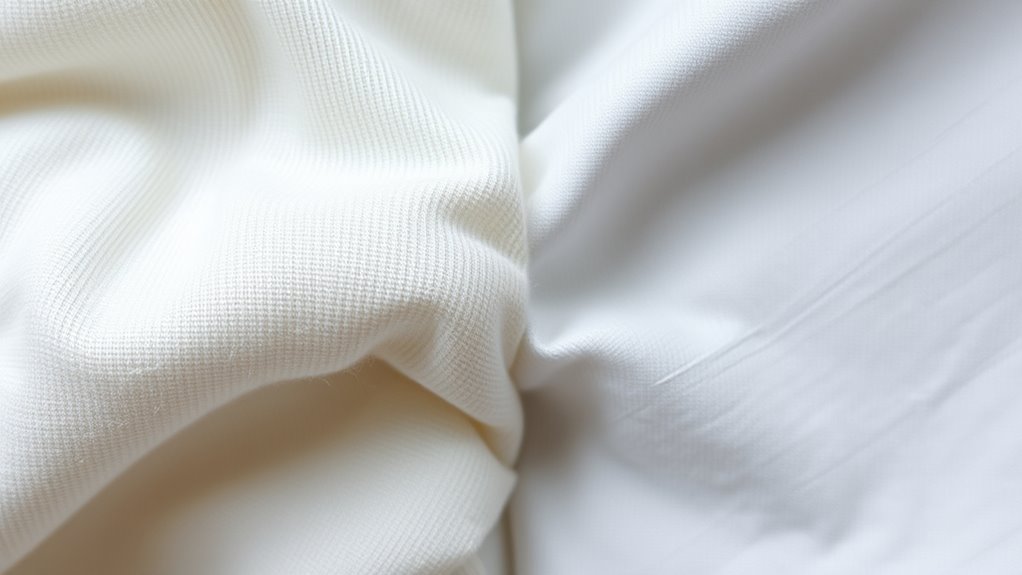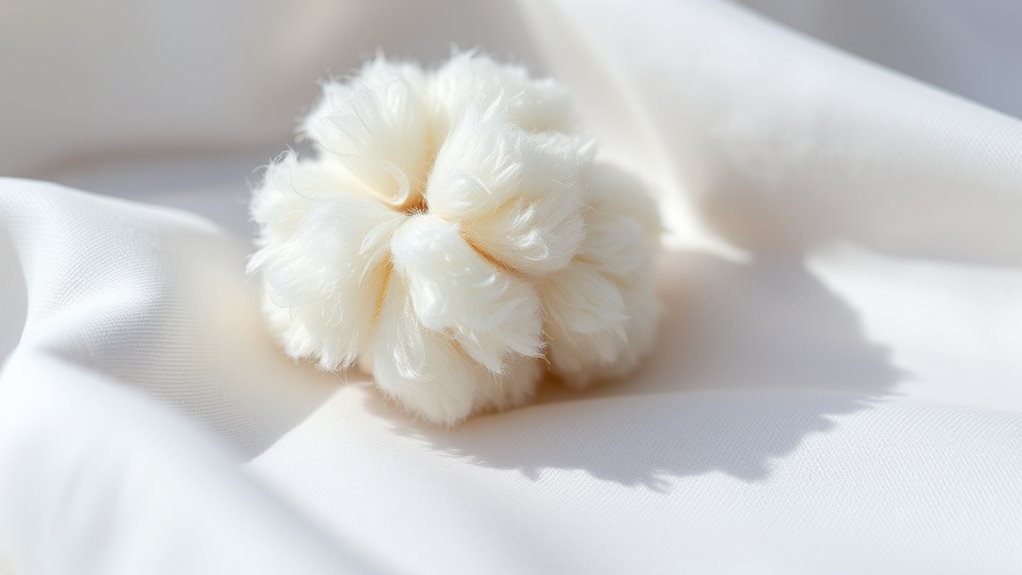When choosing between cotton and polyester, you should consider durability, environmental impact, and sustainability. Cotton feels natural and is biodegradable, but it requires lots of water and chemicals to grow, which can harm ecosystems. Polyester lasts longer and resists wear, but it is made from non-renewable resources and sheds microplastics. If you want a sustainable choice, understanding how each fabric affects the environment will help you decide more wisely—discover more insights below.
Key Takeaways
- Cotton is natural and biodegradable, while polyester is synthetic derived from non-renewable petroleum.
- Polyester offers greater durability and resistance to stretching, shrinking, and wear compared to cotton.
- Cotton cultivation requires significant water, pesticides, and fertilizers, impacting the environment more than polyester production.
- Polyester sheds microplastic fibers during washing, posing environmental concerns, whereas cotton biodegrades naturally.
- Choosing between cotton and polyester depends on balancing eco-friendliness, durability, and environmental impact considerations.

Have you ever wondered which fabric is better for your wardrobe—cotton or polyester? When making this choice, you need to consider more than just how it feels or looks. Fabric durability is a key factor because it determines how long your clothing will last with regular wear and washing. Cotton, a natural fiber, tends to wear out faster over time, especially if not cared for properly. It can weaken and tear more easily, which means you might find yourself replacing cotton garments more frequently. Polyester, on the other hand, is a synthetic fiber designed for resilience. It holds up better against stretching, shrinking, and general wear and tear. If you’re looking for clothing that maintains its shape and lasts longer, polyester often wins in terms of durability. However, durability isn’t the only aspect to consider; the environmental impact of each fabric plays a significant role too. Cotton is often praised for being a natural, biodegradable material, but the way it’s grown and processed can have negative environmental effects. Conventional cotton farming requires significant water, pesticides, and fertilizers, which can harm ecosystems and contribute to pollution. Organic cotton reduces some of these issues but is less common and sometimes more expensive. Polyester, meanwhile, is made from petroleum, a non-renewable resource. Its production involves energy-intensive processes that emit greenhouse gases, contributing to environmental degradation. Furthermore, polyester sheds tiny plastic fibers during washing, which often end up in oceans, affecting marine life. So, while polyester might be more durable, its environmental footprint is substantial. If sustainability matters to you, cotton might seem like a better option, especially organic varieties, but only if you’re mindful of its cultivation impact. Conversely, choosing polyester means accepting its durability advantages at the cost of environmental concerns. Recycling polyester into new fibers can help mitigate some impact, but the process isn’t widespread yet. Additionally, the space efficiency of fabrics can influence your decision, as some fibers are better suited for quick-drying or space-saving clothing. Ultimately, your decision hinges on balancing these factors: if you want durable, long-lasting clothing and are less concerned about environmental impact, polyester could be the way to go. But if you prioritize eco-friendliness and are willing to replace garments more often, cotton might suit you better. Both fabrics have their pros and cons, so understanding these differences helps you make informed choices that reflect your values and lifestyle. Remember, the right fabric for you depends on how you weigh durability against environmental concerns, and how much effort you’re willing to put into caring for your wardrobe.
Frequently Asked Questions
Which Fabric Is More Environmentally Sustainable?
You’ll find that polyester is generally more eco-friendly than cotton, especially when you consider water usage analysis. Did you know that producing a single kilogram of cotton requires about 20,000 liters of water? In an eco friendliness comparison, polyester uses less water and has a lower environmental impact. While both fabrics have pros and cons, polyester’s reduced water footprint makes it a better choice for sustainability-conscious consumers.
How Do Cotton and Polyester Compare in Cost?
You’ll find polyester generally costs less than cotton because it’s cheaper to produce and more durable. Polyester fabric offers better durability and color retention, making it a cost-effective choice for long-lasting garments. Cotton, while often more expensive upfront, may need more frequent replacement due to its lower durability and potential fading. So, if budget and durability matter most, polyester tends to be the more economical option.
Are There Health Concerns Associated With Either Fabric?
You should know that both fabrics can pose health concerns. Chemical treatments used in manufacturing, like dyes and finishing agents, may cause allergic reactions or skin irritation, especially if you have sensitive skin. Polyester, being synthetic, can trap heat and moisture, leading to discomfort or skin issues. Cotton, while generally safer, might still contain residual chemicals from processing. Always check labels and opt for organic or untreated fabrics if you’re concerned about health impacts.
Which Fabric Is Better for Sportswear?
You should choose polyester for sportswear because it offers better moisture-wicking abilities and a superior breathability comparison. Polyester actively pulls sweat away from your skin, keeping you dry and comfortable during intense activities. Cotton, while breathable, absorbs moisture and stays damp longer, which can cause discomfort and chafing. For high-performance sportswear, polyester’s quick-drying and moisture management features make it the better option to enhance your athletic experience.
How Do Laundry Care Requirements Differ?
You should pay attention to washing temperature and drying techniques to care for your fabrics properly. Cotton typically requires warm or cold water and tumble drying on low or medium heat to prevent shrinking. Polyester, however, can be washed in warm water and dried on low heat or air-dried to maintain its shape and durability. Always check care labels to guarantee you’re using the right settings for each fabric type.
Conclusion
When choosing between cotton and polyester, remember that your decision shapes your comfort and style. Cotton offers breathability and a natural feel, while polyester gives you durability and easy care. Think of it like picking between a gentle breeze and a steel fortress—both have their power, but only one truly fits your lifestyle. So, weigh your needs carefully, and let your choice be as bold as a lightning strike—because this decision is anything but ordinary!










